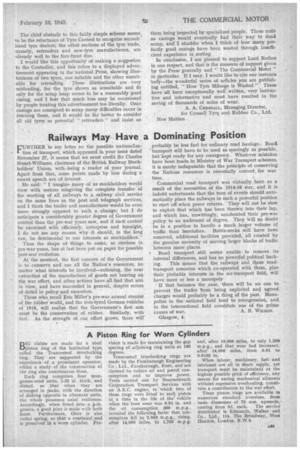Railways May Have . a Dominating Position F URTHER to my letter
Page 33

If you've noticed an error in this article please click here to report it so we can fix it.
on the possible nationalization of transport, which appeared in your issue dated November 27, it seems that we must credit Sir Charles Stuart-Williams, chairman of the British Railway Stockholders' Union, with -being a reader of your journal. Apart from that, some points made by him during a recent speech are of interest.
He said: "1 imagine many of us stockholders would View with serious misgiving the complete transfer:Of the working of all railways to a railway civil service on the same lines as the post and telegraph services, and I think the trader and manufacturer would be even more strongly opposed to such a change; but I do anticipate a considerably greater degree of Government control than the pre-war years saw, and if such control be exercised with efficiencly, enterprise and foresight, I do not see any reason why it should, in the long run, be detrimental to our interests as stockholders."
Thus the shape of things to come, so obvious in pre-war years, has at last been put on paper for possible post-war evolution.
At the monient, the first concern of the Government is to• conserVe and use all the Nation's resources, no matter what interests be involved—rationing, the near extinction of the manufacture of goods not bearing on the war effort, and other actions have all had that aim in view, and have succeeded in general, despite errors of detail in policy and execution. • Those who, recall Eric Miller's pre-war annual resume of the rubber world, and the iron-tyred German vehicles of 1918, will realize that the Government's first aim must be the conservation of rubber. Similarly, with fuel. As, the strength of our effort grows, there will" probably be less fuel for ordinary road haulage.Road transport will have to be used as sparingly as possible, but kept ready for any. emergency. Whatever mistakes have been -made hi Ministry of War Transport schemes, it is surely indisputable that the principle of conserving the Nations resources is essentially correct, for wartime.
Commercial road transport was virtually born as a result of the necessities of the 1914-18 war, and it is indeed unfortunate that the turn of events should automatically place the railways in such a powerful position to start off when peace returns. They will not be slow to exploit that which has been thrown into their lap, and which has, unwittingly, accelerated their pre-war policy to an undreamt of degree. They will no doubt be in a position to handle a much larger volume of traffic than heretofore. Bottle-necks will have been removed, additional facilities provided, all created by the genuine necessity of moving larger blocks of traffic between more places.
• Road transport still seems unable to remove its internal differences, and has no powerful political backing. This means that the railways and those roadtransport concerns which co-operated with them, plus their probable interests in the air-transport field, will have more or less a monopoly If that becomes the case, there will be no one to prevent the trader from being exploited and agreed charges would probably be a thing of the past. Monopolies in the national field tend to retrogression, and in the international field constitute one of the prime causes of war. Glasgow, 4. A. R. Wn.soN.




















































